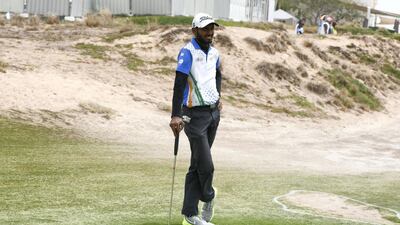Ankush Saha had always struggled with determining distances and directions, making him an unlikely golfer, but his instinct and drive helped him push past his difficulties to bring a silver medal home for India.
Mr Saha, 24, was among 150 golfers with intellectual disabilities, from around the world, to battle the gusty conditions this week to complete a tough 18-hole course at Yas Links Golf Club.
“The wind took everything away at first but the conditions got better. Some holes are difficult. You have to understand the wind. It is a beautiful golf course but you have water bodies so you have to be careful of where to plan your next shot,” said Mr Saha, who is competing in his second world games.
He won a bronze medal in the regional games in Macau in 2017 and was part of the Indian team that won a gold in regional games in 2014.
But for Mr Saha, competing in the Special Olympics is about more than winning medals.
“Golf gives me satisfaction, confidence. It’s me and the golf course. Playing well on this course gives me an opportunity to go to some other country and play my natural game,” he said.
“Representing India at the Special Olympics is an honour for someone like me. The World Games are being held in the Middle East for the first time and that is something very exciting for me. People here are so nice. It is good to be playing here in Abu Dhabi.”
Bipra Saha, his father and coach, explained the extraordinary challenge for a golfer with special needs on an unfamiliar course.
“Ankush usually plays on an ordinary course and he has never played on undulating grounds like this one. It is very difficult to keep the ball on the fairway on a course like this where it’s tough to have depth perception because of the folds of the ground, the water body and breezy conditions,” said the elder Mr Saha.
“But he managed to play rock steady although he was intimidated on the first day by the course and the weather conditions.”
The retired Indian army lieutenant colonel discovered his son’s natural talent for the game when he accompanied him to the golf course at age 14.
“There is so much information he needs to process. On a regular basis his cognitive challenges make it difficult for him to judge distances. Golf and athletics have become his lifeline. It has been a boost to his self-esteem,” he said.
It has been a long journey for the family from being told by doctors that their son would be a paraplegic, after he had seizures that went undiagnosed days after he was born preterm.
His mother Champa Saha, a special needs educator, ensured her son had opportunities to interact with other children and was enrolled in mainstream schools despite lack of awareness in the small towns the family was posted to when his father was in the army.
The younger Mr Saha also runs the marathon and is careful about his diet and exercise routine.
Sports have taught him life skills that his parents hope he can use to mentor other children with disabilities, due to his strong connection with young people.
He also works at Bangalore’s Centre for Autism Spectrum Disorders, where he has developed a rapport with the children, helping to draw them out of their shells.
“He is gentle and children relate to him. When they have temper tantrums, the parents call Ankush to ask how to deal with the child. He looks them in the eye, talks to them and has a calming effect,” said Ms Saha.
Ankush said he has a simple formula and believes that child's stress can sometimes reflect the parents' anxiety.
“Parents should not force their children. The child should explore things by themselves. When children have anger issues, I tell the parents not to put pressure. The children just come up to me on their own. I talk to them and I tell them, ‘Say, thank you to your parents.’ They are everything to you.”


